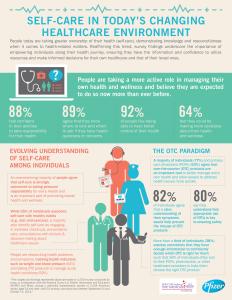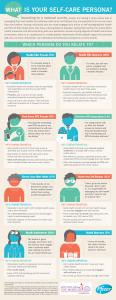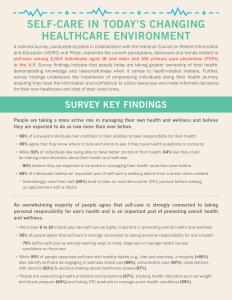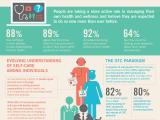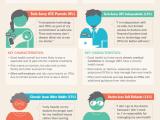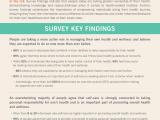Two-Thirds of People Believe They Could be Making More Decisions about Personal Health and Wellness on Their Own
National Survey Underscores Importance of Empowering Individuals with Information within an Evolving Healthcare Environment
The survey was conducted by Ipsos in collaboration with the National Council on Patient Information and Education (NCPIE) and Pfizer. It examined the current perceptions, behaviors and trends among a nationally representative sample of 2,024 U.S. individuals, aged 18 and older, 516 primary care physicians (PCPs) as they relate to managing an individual’s health and wellness, and navigating a changing healthcare landscape.
“The survey findings demonstrate that people have a growing desire to manage their own health and take on these important decisions personally and for their loved ones. In addition to working with healthcare professionals, individuals are actively seeking ways to treat, diagnose, and manage their health conditions and want the information and tools to do it better,” said Ray Bullman, Executive Vice President of NCPIE.
Survey findings revealed that the majority of people agree that over-the-counter (OTC) products – medications available without a prescription – are important tools for better managing their own health, but more than a third (38%) express uncertainty that they have enough information to confidently decide which OTC product is right for them. As such, more than half of people (56%) seek the advice of their PCP, pharmacist or other healthcare provider to help them choose the right OTC product.
Key survey findings include:
Self-Care Perceptions and Behavior
- An overwhelming proportion of people (92%) like being able to have better control of their health, and believe they are expected to be active in managing their own health now more than ever before (80%)
- While 95 percent of people associate self-management of health with good habits such as diet and exercise, a majority (>80%) also identify actions such as engaging in screenings and wellness check-ups (88%), preventative care (87%), consultations with doctors (83%) and decision-making about how they want to deal with a health problem (87%)
- People are researching health problems and symptoms (67%), tracking health indicators such as weight and blood pressure (64%) and taking over-the-counter (OTC) products to manage acute health conditions (59%)
Relationships Between Individuals and Healthcare Providers
- More than one-third of people (34%) strongly agree that they rely on doctors to help manage their healthcare, with a similar number (32%) reporting that they primarily see a doctor to treat a disease or condition
- When it comes to health-related matters, one in three people are actively talking to their doctors (34%) and their pharmacists (33%)
- 60 percent of PCPs see themselves as central drivers of healthcare, with 50 percent agreeing that reliance on a doctor is a primary reason that people don’t readily engage in self-care activities (versus 23% of people)
Use of OTCs in Self-Care
- A majority of people (77%) and PCPs (63%) agree that OTCs allow individuals to address health issues more quickly
- 80 percent of people say they understand that appropriate use of OTCs is key to ensuring safety
- More than half (56%) of people seek the advice of their PCPs, pharmacists or other healthcare providers to help them choose the right OTC product
“With so much information at our fingertips today, advances in technology and more medicines to treat and manage conditions, we need to make sure that health education initiatives keep pace. There is an ongoing need to educate individuals with accurate and up-to-date information so they can continue to take an active role in their own care and that of their loved ones,” said Ray Bullman. “An informed, empowered and confident individual who practices self-care can often feel better faster and save time and money – be it by use of OTCs, avoiding unneeded doctor visits, and diagnosing and treating conditions earlier. Informed, efficient use of health resources ultimately benefits the health system in terms of costs and utilization. This is something we can all invest in and support.”
To access educational self-care resources from NCPIE, visit www.BeMedWise.org or our multimedia news release.
###
About The Survey
In partnership with the National Council on Patient Information and Education (NCPIE) and Pfizer, Ipsos conducted this survey within the United States between September 25 and October 15, 2014, among a nationally representative sample of 2,024 respondents, aged 18 and older, living in the U.S. (people); and 516 primary care physicians, currently practicing medicine, using an online survey and panel to conduct the interviews.
About National Council on Patient Information and Education (NCPIE)
Organized in 1982, the National Council on Patient Information and Education (NCPIE) is a nonprofit coalition of diverse organizations committed to promoting the wise use of medicines through trusted communication for better health. NCPIE works to address critical medicine safe use issues like adherence improvement, prescription drug abuse prevention, reduction of medication errors, and quality improvements in healthcare provider-patient communication. For more information, visit www.BeMedWise.org.
About Pfizer Inc.
At Pfizer, we apply science and our global resources to bring therapies to people that extend and significantly improve their lives. We strive to set the standard for quality, safety and value in the discovery, development and manufacture of health care products. Our global portfolio includes medicines and vaccines as well as many of the world’s best-known consumer health care products. Every day, Pfizer colleagues work across developed and emerging markets to advance wellness, prevention, treatments and cures that challenge the most feared diseases of our time. Consistent with our responsibility as one of the world’s premier innovative biopharmaceutical companies, we collaborate with health care providers, governments and local communities to support and expand access to reliable, affordable health care around the world. For more than 150 years, Pfizer has worked to make a difference for all who rely on us. To learn more, please visit us at www.pfizer.com.
Contact:
National Council on Patient Information and Education (NCPIE):
Ray Bullman
(301) 340-3940
[email protected]
Photo Gallery
Media Contact
National Council onPatient Information
and Education (NCPIE):
Ray Bullman
(301) 340-3940
[email protected]
Documents
Which Self-Care Consumer Are You? Self-Care Survey Infographic Self-Care Survey Fact SheetRelated Links
BeMedWise.org



